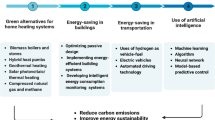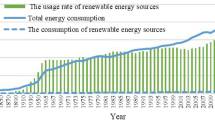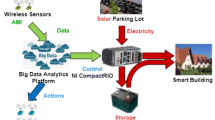Abstract
Stability issues in the electric power grid originate from the rising of renewable energy generation and the increasing number of electric vehicles. The uncertainty and the distributed nature of generation and consumption demand for optimal allocation of energy resources, which, in the absence of sufficient control reserve for power generation, can be achieved using demand-response. A price signal can be exploited to reflect the availability of energy. In this paper, market-based energy allocation solutions for small energy grids are discussed and implemented in a simulator, which is released for open use. Artificial neural network controllers for energy prosumers can be designed to minimize individual and overall running costs. This enables a better use of local energy production from renewable sources, while considering residents’ necessities to minimize discomfort.


Similar content being viewed by others
Notes
References
Monacchi A, Elmenreich W, D’Alessandro S, Tonello AM (2013) Strategies for energy conservation in carinthia and friuli-venezia giulia. In: Proc. of the 39th Annual Conference of the IEEE Industrial Electronics Society, Vienna, Austria
Palensky P, Dietrich D (2011) Demand side management: demand response, intelligent energy systems, and smart loads. IEEE Trans Ind Informat 7(3):381–388
Clearwater SH (ed) (1996) Market-based control: a paradigm for distributed resource allocation. World Scientific, River Edge
Parsons S, Rodriguez-Aguilar JA, Klein M (2011) Auctions and bidding: a guide for computer scientists. ACM Comput Surv 43(2):1–10
Smith VL (1962) An experimental study of competitive market behavior. J Political Econ 70(2):111–137
Alam M, Ramchurn SD, Rogers A (2013) Cooperative energy exchange for the efficient use of energy and resources in remote communities. In: Proc. of the 2013 International Conference on Autonomous Agents and Multi-agent Systems, ser. AAMAS ’13, pp. 731–738
Ygge F, Akkermans H (1996) Power load management as a computational market. In: Second International Conference on Multiagent Systems (ICMAS), Kyoto, pp. 393–400
Kok K, Roossien B, MacDougall P, van Pruissen O, Venekamp G, Kamphuis R, Laarakkers J, Warmer C (2012) Dynamic pricing by scalable energy management systems - field experiences and simulation results using powermatcher. In: IEEE Power and Energy Society General Meeting, July 2012, pp. 1–8
Wijaya T, Banerjee D, Ganu T, Chakraborty D, Battacharya S, Papaioannou T, Seetharam D, Aberer K (2013) Drsim: a cyber physical simulator for demand response systems. In: Proc. of the IEEE International Conference on Smart Grid Communications (SmartGridComm), Oct 2013, pp. 217–222
Fehérvári I, Elmenreich W (2010) Evolving neural network controllers for a team of self-organizing robots. J Robot
Sobe A, Fehervari I, Elmenreich W (2012) FREVO: a tool for evolving and evaluating self-organizing systems. In: Proc. of the IEEE Sixth International Conference on Self-Adaptive and Self-Organizing Systems Workshops (SASOW), Sept 2012, pp. 105–110
Elmenreich W, de Meer H (2008) Self-organizing networked systems for technical applications: a discussion on open issues. In: Proc. of the Third International Workshop on Self-Organizing Systems. Hummel JSKA (ed) Springer, pp. 1–9
Ilic D, Da Silva P, Karnouskos S, Griesemer M (2012) An energy market for trading electricity in smart grid neighbourhoods. In: Proc. of the 6th IEEE International Conference on Digital Ecosystems Technologies (DEST), June 2012, pp. 1–6
Vytelingum P, Ramchurn SD, Voice TD, Rogers A, Jennings NR (2010) Trading agents for the smart electricity grid. In: Proc. of the 9th International Conference on Autonomous Agents and Multiagent Systems (AAMAS ’10), pp. 897–904
Tan Z, Gurd J (2007) Market-based grid resource allocation using a stable continuous double auction. In: 8th IEEE/ACM International Conference on Grid Computing, Sept 2007, pp. 283–290
Brewer P, Huang M, Nelson B, Plott C (2002) On the behavioral foundations of the law of supply and demand: human convergence and robot randomness. Exp Econ 5(3):179–208
Phelps S, Cai K, McBurney P, Niu J, Parsons S, Sklar E (2008) Auctions, evolution, and multi-agent learning. In: Adaptive Agents and Multi-Agent Systems III. Adaptation and Multi-Agent Learning, ser. Lecture Notes in Computer Science. vol. 4865, Springer, Berlin Heidelberg, pp. 188–210
Chun BN, Culler DE (2002) User-centric performance analysis of market-based cluster batch schedulers. In: Proc. of the 2Nd IEEE/ACM International Symposium on Cluster Computing and the Grid, pp. 30–39
Pöchacker M, Khatib T, Elmenreich W (2014) The microgrid simulation tool RAPSim: description and case study. In Proc. of the (2014) IEEE Innovative Smart Grid Technologies (ISGT) Conference-Asia. Kuala Lumpur, Malaysia, May 2014
Egarter D, Monacchi A, Khatib T, Elmenreich W (2014) Integration of legacy appliances into home energy management systems. arXiv preprint arXiv:1406.3252
Monacchi A, Egarter D, Elmenreich W, D’Alessandro S, Tonello AM (2014) GREEND: an energy consumption dataset of households in Italy and Austria. In: Proc. of IEEE International Conference on Smart Grid Communications (SmartGridComm), Venice, Italy, Nov 2014
Eiben AE, Smith JE (2003) Introduction to evolutionary computing. Springer, Berlin
Monacchi A, Zhevzhyk S, Elmenreich W (2014) Home energy market simulator: the scenario definition format. Alpen-Adria Universität Klagenfurt,Technical Report
Acknowledgments
Work supported by Lakeside Labs, Klagenfurt, Austria and funded by the European Regional Development Fund (ERDF) and the Carinthian Economic Promotion Fund (KWF) under Grant 20214-22935-34445 (Smart Microgrid) and 20214-23743-35469-35470 (MONERGY). We would like to thank P. Grippa, M. Pöchacker and D. Egarter for the feedback.
Author information
Authors and Affiliations
Corresponding author
Rights and permissions
About this article
Cite this article
Monacchi, A., Zhevzhyk, S. & Elmenreich, W. HEMS: a home energy market simulator. Comput Sci Res Dev 31, 111–118 (2016). https://doi.org/10.1007/s00450-014-0291-7
Published:
Issue Date:
DOI: https://doi.org/10.1007/s00450-014-0291-7




